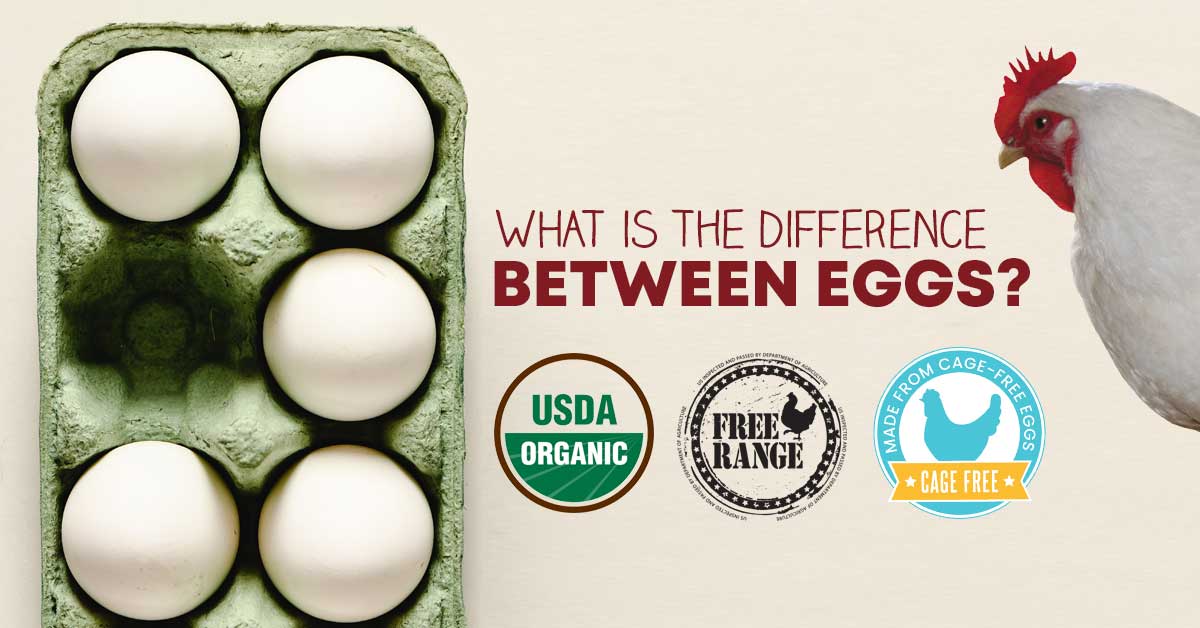Eggs are an increasingly complex food category to shop for due to the wealth of options available at many grocery stores.
The standards surrounding organic foods have changed and evolved in the past decades, but eggs take things a step farther with additional labels for free-range, cage-free, or omega-3 enriched. We will cover the basics of each of many of these labels and what the bottom line is for your health.
Though eggs are high in cholesterol, they do serve as a great source of vitamin B12, vitamin D, and protein when eaten in moderation.
Does the Egg Color Make a Difference?
The most widely available color of eggs is white, however, somewhat larger brown eggs are also an option. The egg’s color has no real impact on taste or nutritional value, however, it does indicate what type of hen laid the egg.
Hens with white feathers lay white eggs while hens with brown feathers lay brown eggs.
What are Cage-Free Eggs?
As the name would indicate, these eggs are from hens that are not raised in cages, but instead in what is usually an open barn setting. The USDA does regulate the use of this phrase in marketing, how open the setting is could be open for debate.
Generally, this has no special impact on the eggs, though some skeptics have pointed out that the open nature of these settings could lead to more fighting between hen’s thus decreasing the quality of the eggs.
What are Free-Range Eggs?
Very similar to cage-free, just this takes the concept a step further. To fit this criteria, hens must be allowed to go outside (which is not the case with cage-free). Again, the size of the outdoor space is not defined, and this has no clear difference in the quality of the egg.
What are Omega-3 Enriched Eggs?
Now we’re getting to some that actually make a difference to the nutritional standards.
The yolk in eggs contains some omega-3 fatty acid, which is boosted in omega-3 enriched eggs by feeding the hens a diet that contains flaxseed. Though omega-3 is heart-healthy, it is somewhat contradicted by the large amount of cholesterol found in eggs.
What are Vegetarian-Fed Eggs?
Up until the 1990’s it was not uncommon for chickens to eat diets that contained animal byproducts. However, this is quite uncommon now, meaning most eggs already fall into this category, whether they include it on the label or not.
Are Organic Eggs Better?
These eggs come from hens that eat organic feed and are not given vaccines or antibiotics. For a hen’s eggs to be organic, the hen itself must be on an organic diet and only eat food that is classified as such. Like all organic foods, the use of the phrase “organic” is regulated by the USDA on the products.
A 2010 study completed by Penn State found that organic eggs are subjectively healthier with boosted amounts of vitamin E, vitamin A, and omega-3 compared to typical consumer eggs.
The Verdict
While there are plenty of different types of eggs to shop for, the reality is only organic eggs have a meaningful nutritional difference for their consumers. Many of these labels are too open ended in the requirements to use the phrase, and as a result, diluting the phrase’s overall meaning.


